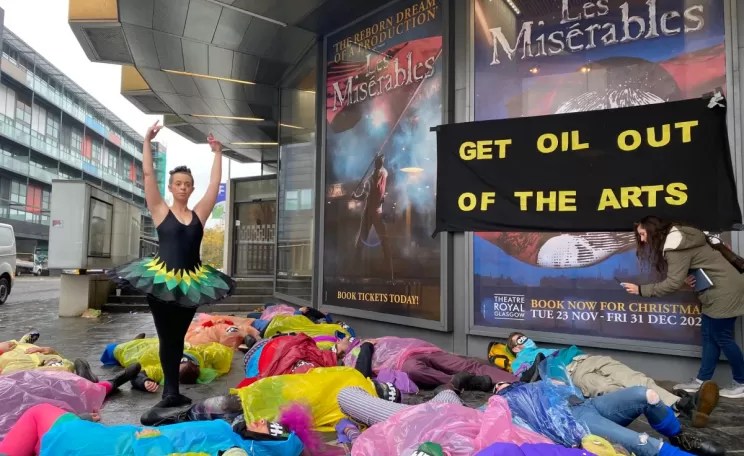How can we unite against climate breakdown and envision a future not plagued by bad forms of power – in our unions, our energy system and our society?
Norwegian oil and gas workers downed tools and went on strike over pay in July 2022. Just one strike day later, the government had intervened.
“Norway plays a vital role in supplying gas to Europe, and the planned escalation would have had serious consequences, for Britain, Germany and other nations,” Marte Mjøs Persen, the labour minister, told Reuters.
This article first appeared in the latest issue of the Resurgence & Ecologist magazine.
The speed at which the government stepped in shows us the centrality of energy in the modern global economy.
Strategic
And yet this centrality may also go some way towards explaining why the energy sector is so difficult to transform, why energy companies seem to command so much power over states, and why governments are so spooked when production comes to a standstill or gets interrupted by war or a pandemic.
As a force to stop extractive capital from ravaging the planet, trade unions could be unrivalled.
Energy workers have the expertise to inform our campaigns for a just transition to green energy, and then to help implement it.
But, more importantly, they have the power to demand change and shut down the sector through strike action, which could offer huge strategic opportunities to the climate movement.
Yet relationships between environmentalists and the unions in Britain’s energy sector - such as Unite and GMB - have not always been harmonious.
Harmful
The unions’ record is mired by a history of partnership with energy sector bosses and protectionist policies to prevent job losses in the oil and gas sectors.
Meanwhile, the climate movement has become divided over ‘green capitalism’, deterring some union activists.
How can we unite against climate breakdown and envision a future not plagued by bad forms of power – in our unions, our energy system and our society?
Unions are inherently contradictory. In his new book Workers Can Win: A Guide to Organising at Work, trade unionist Ian Allinson writes: “Unions are organisations of resistance to employers but we also use unions to agree the terms of our exploitation with management.”
Part of agreeing the terms of our exploitation involves agreeing that our jobs will continue to exist. In the extractive industries, union leaderships can end up arguing for the continued existence of harmful and destructive sectors.

Competition
How can we unite against climate breakdown and envision a future not plagued by bad forms of power – in our unions, our energy system and our society?
This isn’t limited to the environment: it has also happened in relation to Trident and other nuclear weapons.
A motion debated at Unite’s 2016 conference lays out an analogous argument: “Unite remains opposed in principle to the possession or deployment of nuclear weapons (including Trident) but our first duty remains to our members.
"Therefore until there is a government in office ready, willing and able to give cast-iron guarantees on the security of the skilled work and all the employment involved, our priority must be to defend and secure our members’ employment.”
Despite this protectionist tendency also being reflected in their positions on the energy sector, there is a powerful movement of workers in these unions who recognise that this can only be a short-term solution; that their jobs shouldn’t come at the expense of the climate and peace.
In 2017, many workers in North Sea oil expressed support for Allinson when he stood for the position of Unite General Secretary as a candidate whose platform explicitly included the need for a just transition to green energy.
Fossil fuels are ever-depleting and are subject to huge amounts of capitalist competition. This leads to closures and the risk of losing jobs in the long term.
Glaringly
In recent years, the union and climate movements have been finding ways to work together productively.
Jeremy Corbyn’s Labour pushed the idea of a Green Industrial Revolution, which – however debatable as a strategy, given its growth focus – inspired new audiences to think about a future in which energy supplies were untethered from the petrodollar.
The TUC has stated support for decarbonisation and a just transition. One Million Climate Jobs campaigners have cut through the ‘jobs–environment’ juxtaposition.
XR Trade Unionists have brought together workers into groups to take environmentalist direct action. Scot.E3 (Employment, Energy and Environment) are trade unionists, mostly in construction and defence, who fight inside and outside their unions for a just transition.
With the cost-of-living crisis intensifying, driven by spiralling energy prices this autumn, moving away from a fossil fuel economy is becoming a glaringly obvious goal for workers’ movements.
Now is the time to work together effectively: there’s power in a union.
This Author
Kate Bradley is a long-time feminist and ecosocialist activist. She is the campaigns officer for Greater Manchester Law Centre and is active in the trade union movement. This article first appeared in the latest issue of the Resurgence & Ecologist magazine.




